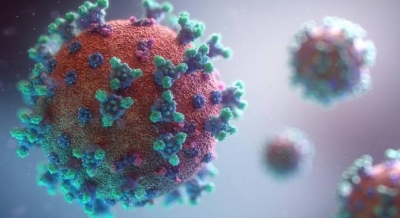The new Covid-19 adjuvant drug 2-deoxy-D-glucose (2-DG) impacts only the coronavirus affected cells and not the good cells in the human body, said one of the improved process inventors.
He also said the drug reduces the oxygen dependency of Covid-19 patients.
Advertisement
“The 2-DG drug impacts the cells that are affected by coronavirus and prevent their multiplication. The drug will not affect the good cells,” Rakesh Kumar Sharma, Vice Chancellor, Saveetha Institute of Medical and Technical Sciences (SIMTS) here.
Sharma was one of the co-inventors of the improved process of 2-DG when he was with the Defence Research Development Organisation (DRDO).
The technology was later transferred to drug major Dr. Reddy’s Laboratories in 2004 for Rs.25 lakh.
He and other team members had developed a process of its synthesis and upscaled it in collaboration with the Defence Research Development Establishment, Gwalior. It was granted Indian Patent No.187908 dated 28-2-2003.
The 2-DG drug comes in powder form packed in sachets.
Initially the drug was tested for treating cancer. The cancer cells multiply fast like that of the coronavirus infected ones.
Sharma said the coronavirus needs energy to multiply. Last year when Covid-19 pandemic broke out, the drug was reviewed and phase I and II clinical studies were made on 110 patients.
The 2-DG does not result in production of energy or prohibits energy production in the cells and hence resulting in its death.
According to Sharma, a total of 110 patients were part of the Phase-II clinical trials of this drug. In terms of improvement in vital signs of symptomatic patients who were administered the drug, a difference of 2.5 days was seen compared to Standard of Care (SoC).
It has shown better efficacy in phase two itself as compared to the standard care.
Approval for Phase-III trials was given in November and trials were conducted at 27 Covid hospitals in Delhi, Uttar Pradesh, West Bengal, Gujarat, Rajasthan, Maharashtra, Andhra Pradesh, Telangana, Karnataka and Tamil Nadu.
In the third phase, 220 patients were enrolled. It was started on 12-01-2021, Sharma said.
Saveetha Medical College & Hospital is the only private Hospital in Tamil Nadu to be selected for the Phase-III Clinical trial by DRDO and Dr. Reddy’s Laboratories.
Sharma said three patients participated in the clinical trial at Saveetha Medical College & Hospital. The three were clinically categorised as “moderate Covid-19 patients”.
“All the three patients were successfully discharged within three to seven days once they were completely cured with RTPCR- Negative reports,” he said.
Data pertaining to these trials showed reduced dependence on oxygen among moderate cases of Covid-19, even in patients aged 65 and above.
After its entry, the virus reprogrammes the host cell metabolism. The metabolic demand of virally infected cells is upregulated primarily through high glucose uptake and glycolysis for rapid and higher viral replication.
Virus-infected cells consume 30-50 fold more oxygen and adenosine triphosphate (ATP) than the normal cells.
Sharma said the rates of glucose transport and glycolysis are increased to meet the increased energy demands for its rapid replication similar to malignant cells.
2-DGA acts as a decoy/mimic for glucose and selectively inhibits Glycolysis.
The changed metabolic state allows for selective accumulation of 2- DG in virally infected cells.
2-DG also inhibits the synthesis of anabolic intermediates required for the viral replication process.
There is some evidence that it interferes with N-linked glycosylation of viral proteins in the endoplasmic reticulum of infected cells, causing misfolding of viral glycoproteins leading to non-infective or non-virulent virus particles (virions), he added.
“Before DRDO conducted trials on the drug, scientists and experts from Patanjali Ayurved Ltd, Jain Vishwa Bharti Institute, and Saveetha Institute of Medical and Technical Sciences hadApublishedAa paper in March 2020 on the possible use of the molecule for COVID-19,a Sharma remarked.











